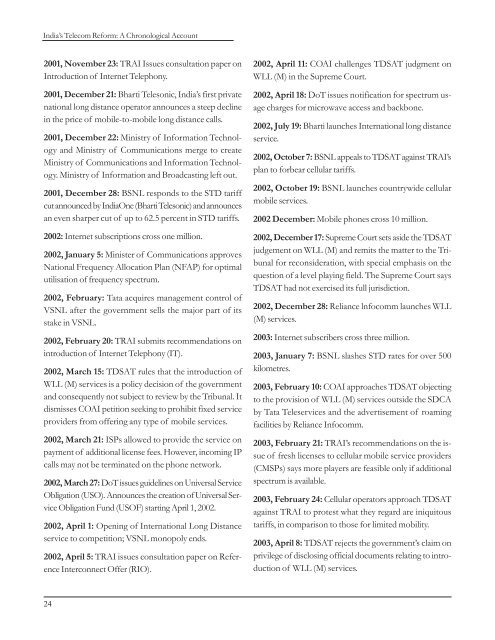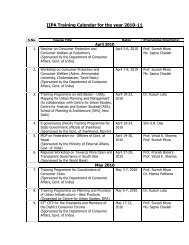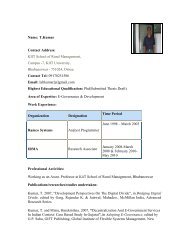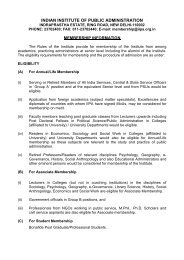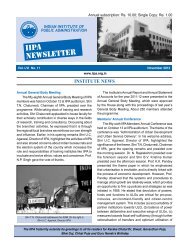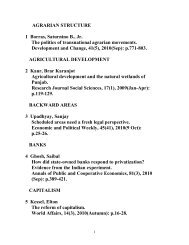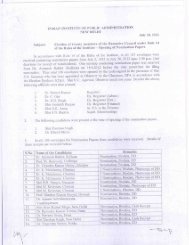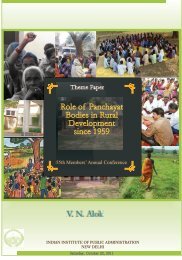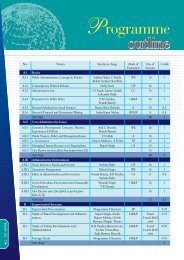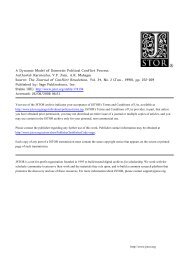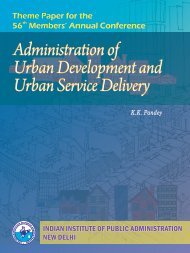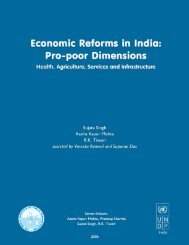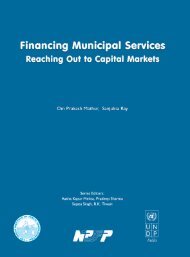India's Telecom Reform - Indian Institute of Public Administration
India's Telecom Reform - Indian Institute of Public Administration
India's Telecom Reform - Indian Institute of Public Administration
Create successful ePaper yourself
Turn your PDF publications into a flip-book with our unique Google optimized e-Paper software.
India’s <strong>Telecom</strong> <strong>Reform</strong>: A Chronological Account<br />
2001, November 23: TRAI Issues consultation paper on<br />
Introduction <strong>of</strong> Internet Telephony.<br />
2001, December 21: Bharti Telesonic, India’s first private<br />
national long distance operator announces a steep decline<br />
in the price <strong>of</strong> mobile-to-mobile long distance calls.<br />
2001, December 22: Ministry <strong>of</strong> Information Technology<br />
and Ministry <strong>of</strong> Communications merge to create<br />
Ministry <strong>of</strong> Communications and Information Technology.<br />
Ministry <strong>of</strong> Information and Broadcasting left out.<br />
2001, December 28: BSNL responds to the STD tariff<br />
cut announced by IndiaOne (Bharti Telesonic) and announces<br />
an even sharper cut <strong>of</strong> up to 62.5 percent in STD tariffs.<br />
2002: Internet subscriptions cross one million.<br />
2002, January 5: Minister <strong>of</strong> Communications approves<br />
National Frequency Allocation Plan (NFAP) for optimal<br />
utilisation <strong>of</strong> frequency spectrum.<br />
2002, February: Tata acquires management control <strong>of</strong><br />
VSNL after the government sells the major part <strong>of</strong> its<br />
stake in VSNL.<br />
2002, February 20: TRAI submits recommendations on<br />
introduction <strong>of</strong> Internet Telephony (IT).<br />
2002, March 15: TDSAT rules that the introduction <strong>of</strong><br />
WLL (M) services is a policy decision <strong>of</strong> the government<br />
and consequently not subject to review by the Tribunal. It<br />
dismisses COAI petition seeking to prohibit fixed service<br />
providers from <strong>of</strong>fering any type <strong>of</strong> mobile services.<br />
2002, March 21: ISPs allowed to provide the service on<br />
payment <strong>of</strong> additional license fees. However, incoming IP<br />
calls may not be terminated on the phone network.<br />
2002, March 27: DoT issues guidelines on Universal Service<br />
Obligation (USO). Announces the creation <strong>of</strong> Universal Service<br />
Obligation Fund (USOF) starting April 1, 2002.<br />
2002, April 1: Opening <strong>of</strong> International Long Distance<br />
service to competition; VSNL monopoly ends.<br />
2002, April 5: TRAI issues consultation paper on Reference<br />
Interconnect Offer (RIO).<br />
2002, April 11: COAI challenges TDSAT judgment on<br />
WLL (M) in the Supreme Court.<br />
2002, April 18: DoT issues notification for spectrum usage<br />
charges for microwave access and backbone.<br />
2002, July 19: Bharti launches International long distance<br />
service.<br />
2002, October 7: BSNL appeals to TDSAT against TRAI’s<br />
plan to forbear cellular tariffs.<br />
2002, October 19: BSNL launches countrywide cellular<br />
mobile services.<br />
2002 December: Mobile phones cross 10 million.<br />
2002, December 17: Supreme Court sets aside the TDSAT<br />
judgement on WLL (M) and remits the matter to the Tribunal<br />
for reconsideration, with special emphasis on the<br />
question <strong>of</strong> a level playing field. The Supreme Court says<br />
TDSAT had not exercised its full jurisdiction.<br />
2002, December 28: Reliance lnfocomm launches WLL<br />
(M) services.<br />
2003: Internet subscribers cross three million.<br />
2003, January 7: BSNL slashes STD rates for over 500<br />
kilometres.<br />
2003, February 10: COAI approaches TDSAT objecting<br />
to the provision <strong>of</strong> WLL (M) services outside the SDCA<br />
by Tata Teleservices and the advertisement <strong>of</strong> roaming<br />
facilities by Reliance Infocomm.<br />
2003, February 21: TRAI’s recommendations on the issue<br />
<strong>of</strong> fresh licenses to cellular mobile service providers<br />
(CMSPs) says more players are feasible only if additional<br />
spectrum is available.<br />
2003, February 24: Cellular operators approach TDSAT<br />
against TRAI to protest what they regard are iniquitous<br />
tariffs, in comparison to those for limited mobility.<br />
2003, April 8: TDSAT rejects the government’s claim on<br />
privilege <strong>of</strong> disclosing <strong>of</strong>ficial documents relating to introduction<br />
<strong>of</strong> WLL (M) services.<br />
24


